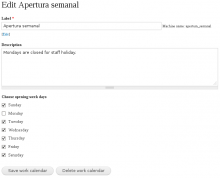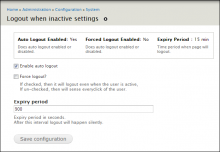Add functionality and customize your Drupal application with thousands of projects contributed by our amazing community.
A module is code that extends Drupal's by altering existing functionality or adding new features. You can use modules contributed by others or create your own. Learn more about creating and using Drupal modules.
Add CC addresses to your webform emails. Includes a patch file for webform that only affects the layout of the email edit page. Module functions without any hacks to webform.
Allows HTML5 autocomplete attributes to be set for form input elements to help browsers to autofill them. Speed up prospective form filling times by helping browsers autocomplete your form fields with the correct type of data. Alternatively, disable autofill suggestions if your webform fields contain sensitive information.
Views Exposed Forms #Ajax Support
Work Calendar allows to define yearly working/holiday calendars.
In general, these calendars can define what dates in a year are considered available or not, for any purpose.
Restric Admin IP allow you to define in your settings.php, a range of ip addresses for administrator role: only user's who come from this ip address can login with administration role
This is a demo sandbox module
A Drush plugin to flip CSS files. RTL to LTR and vice versa.
First bone to have the drush cssflip command work to flip css files .
Provides an option to force-disable WYSIWYG on all text field types that have 'Text processing' set to 'Filtered text' and hence can use WYSIWYG).
This module provides provides the ability to choose a menu parent item whose links will be added to the configured pages as tabs.
Features
Changes the Drupal Username to chilean RUT. This is a quiet basic system, this is not changing existing users or handle different types of passport or tax numbers.
Introduction
When using the core OpenID module, you have to fill the URL of the OpenID provider in the textfield in the login form.
In some usecases you have one specific OpenID provider and you don't want the user to be able to user other providers or to be asked to input the provider URL.
While searching for a solution for this problem, I came across the OpenID Single Sign On Relying Party module, which requires the provider to be a Drupal site. In my case the provider is not a Drupal site.
I took the aforementioned module and rewrote it to my purposes.
A lot of the code in this module comes from the other module, I just took the liberty to reuse it for this module.
The OpenID single provider module lets you configure a OpenID provider which
will always be used. Instead of a normal login block, the user will only see
a "Login to OpenID" button on the login block which will redirect him to the
OpenID provider.
Installation
1. This module requires the the openid module.
Make sure that the module is enabled.
2. Copy this openid_single_provider/ directory to your sites/SITENAME/modules
directory.
3. Enable the module in admin/modules
4. Configure the module in admin/config/people/openid-single-provider
Usage
This module is a drop-in replacement for dblog.
This module was created to show a medallion type, floating at the bottom of website .
Features:
- Animated scroll to the bottom
- Animated rocking of the medallion
Cthulhu is a cosmic entity.
Tracks conversions on your site in Facebook and AdWords.
Module adds a tab in Services to provide service description for Guzzle library.
The SCO Node module allows nodes to be created that contain SCORM content. The SCO content can then be played and scored on a Drupal 7 site.
This module enable Acobot and SnapEnage to work together on Drupal websites:
This module enable Acobot and Olark to work together on Drupal websites:
RSVP lets users invite people to attend an event.
The Drupal Logout When Inactive module logs out the current user when users are inactive for certain time.
A field formatter for Relation that renders the endpoints as fully rendered entities (with view mode selection per e
Pages
 Support for Drupal 7 is ending on 5 January 2025—it’s time to migrate to Drupal 10! Learn about the many benefits of Drupal 10 and find migration tools in our resource center.
Support for Drupal 7 is ending on 5 January 2025—it’s time to migrate to Drupal 10! Learn about the many benefits of Drupal 10 and find migration tools in our resource center.



